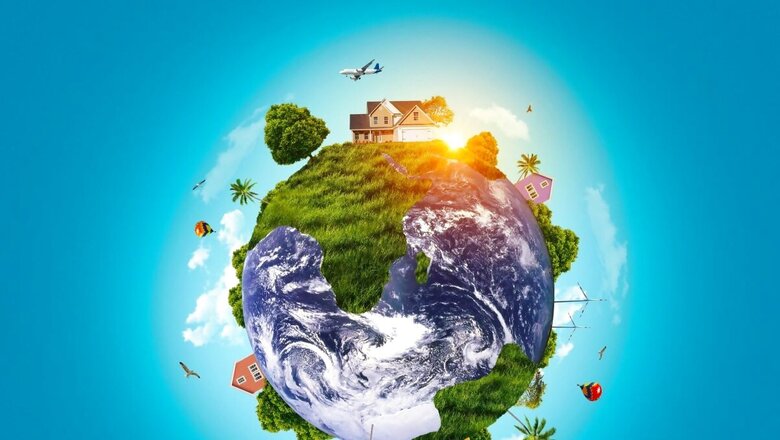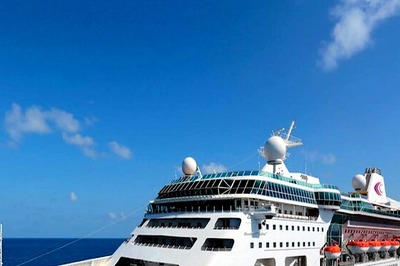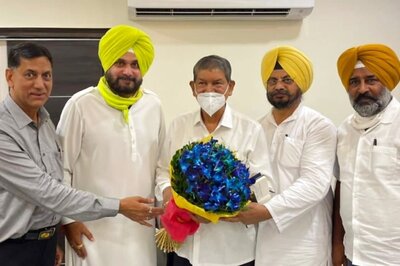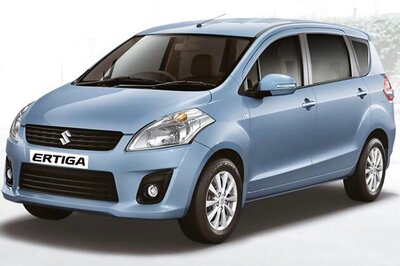
views
There has never been a more crucial time for society to collectively become more aware of how we as individuals, corporations, and businesses are harming the world, as climate change is a problem that isn’t going away. It’s high time to do something at an individual level. Because of the ongoing depletion of natural resources, businesses with high energy needs are now more environmentally conscious than ever.
These days, a lot of businesses are working hard to offer simple and straightforward options for using less plastic, recyclable packaging, sustainable goods, organic food, and a variety of other ways to make environmentally friendly choices. Here are some brands that are leading the way in sustainability:
The Body Shop in the Beauty industry
Since its inception in 1976, the brand has expanded and revolutionized the beauty industry by empowering women, society and environment at the same time. They believe in fair trade and have been committed to delivering as the World’s most ethical and sustainable global business for over 40 years.
It’s no secret that The Body Shop has been at the forefront of the sustainability movement for a while now. Embodying the concept of being eco-friendly, this brand strives to protect the environment at every step of the way. Right from their products sourced from natural origins to nearly 70% of the packaging being fully recyclable, the brand aims to become 100% Vegan by the end of 2023. Plastics for Change by The Body Shop is yet another step towards recycling plastics empowering the waste pickers in Bengaluru, India. Their newly launched Activist Workshop stores have a unique sustainability concept where not only products but even store fixtures are outfitted with recycled and sustainable materials. Customers are also encouraged to recycle their used plastic bottles as part of the brand’s “Return, Recycle, Repeat” initiative. By using this in-store campaign, the brand aims to recycle 1 million plastic bottles by the year 2024.
The brand has been fearlessly striving to balance care for the environment and people with profit since the inception.
Ford, Motor Company in the auto industry
One of the worst polluters is recognised to be the automotive industry. Ford Motor Company, on the other hand, is rewriting this story with their long-standing, ten-part environmental policy. While 80% of the business’s Focus and Escape vehicles are recyclable, the company also utilizes sustainable fabrics in its automobiles. The company offers a clean diesel heavy duty pickup truck and has a strong emphasis on fuel efficiency, notably with the six-speed gearbox. Additionally, the company’s plant in Michigan recycles paint fumes into gasoline.
American Eagle in world of Fashion
American Eagle has launched ‘Real Good’ products as part of its larger sustainability goals. The company has committed to switching to more sustainable raw materials and utilizing less water and energy in order to become carbon neutral by 2030. The ‘Real Good’ badge now lets customers know which items in the collection are environmentally friendly. The collection consists of materials that have been produced and/or sourced sustainably, including recycled polyester and nylon as well as cotton that has been organically grown, recycled, or sourced responsibly as part of the Better Cotton Initiative. Real Good jeans are produced in factories that adhere to standards for water management, wastewater volume reduction, hazardous chemical-free wastewater, and water recycling.
Brillare for their 100% natural product formulations
Brillare is India’s most authentic beauty and personal care brand with 100% ingredient transparency that offers completely natural, safe, and cruelty-free products. The entire initiative of Brillare is called a “Zero Dilution Promise”. It delivers sustainable dermatology-grade results from all-natural nutrition and also discloses every product ingredient on the pack and proves its authenticity upfront.
PepsiCo India in the arena of business giants
Driven with its ‘Winning with pep+’ philosophy, PepsiCo India has been committed to #BeatPlasticPollution and strives to build a world where plastic never becomes waste. Over the last 30+ years, PepsiCo India has built a strong and sustainable ecosystem based on partnerships with local businesses and communities and insightful innovation that resonates with Indian consumers.
PepsiCo’s vision of sustainability fundamentally rests on three pillars: Reducing the amount of plastics; Recycling the plastics used; and Reinventing plastic packaging. Aligned with the Government of India’s Swachh Bharat Mission, PepsiCo India in partnership with United Way Delhi launched ‘Tidy Trails’ – a special initiative to sustainably manage post-consumer plastic waste in Mathura Vrindavan in September 2021. The initiative encourages people to keep their local environment clean and foster ‘tidy’ness, thereby setting good examples and inspiring other communities to follow.
As part of the initiative, special mobile vans were deployed to visit 200 establishments across across Mathura-Vrindavan to collect plastic waste. The collected plastic is later recycled/repurposed into tables and chairs, which are installed at various public places, especially tourists’ spots. Mass awareness drives are conducted through public events, online workshops, nukkad-natak and competitions for communities along with activities that run Pan-India throughout the year such as Plog Run, Dry Waste Management Education Initiative among others also reinforce the message.
As a result, Tidy Trails has reached 6.2 lakh people, collected 25,000 kgs of plastic, involved 70 municipal wards and trained 4,000 property units over waste segregation. Made from recycled plastic, 14 benches along with the ‘I Love Mathura-Vrindavan’ signage have been installed in Mathura. Following the success of the campaign, PepsiCo India is planning to expand the initiative ‘Tidy Trails’ across the country.
ASICS in the world of sport
Fans of sports and exercise who wish to maintain their levels of activity while minimizing their environmental impact need to look at the new line of environmentally friendly shoes and clothes that ASICS unveiled on Earth Day. Utilizing a circular production strategy, the new pack cross-category collection was made utilizing around 5 tonnes of textile waste; the equivalent of 25,000 t-shirts, that were converted into new shoes.
Solution dyeing, a resource-saving process used to create the shoe’s sock lining, lowers water use by about 33% and CO2 emissions by about 45% when compared to traditional dyeing methods.
Kitkat in the FMCG category
By 2025, KitKat promises to be carbon neutral. As part of the plan, it wants to cut the emissions produced by sourcing its components, producing the product, and distributing it by more than 50%. It has pledged to quicken the switch to renewable electricity and increase its regenerative agriculture. In order to calculate the brand’s current carbon impact, KitKat has joined forces with The Carbon Trust, a global climate change and sustainability consultancy.
Shahnaz Husain Group in the beauty industry
The World Environment Day 2023 will focus on solutions to plastic pollution under the campaign #BeatPlasticPollution. It is a reminder that people’s actions on plastic pollution matters. “We at Shahnaz Husain Group have ensured that our products are inspired by the ancient medicinal system of Ayurveda that emphasizes the use of natural, organic ingredients for bodily health. Absolute bare minimum use of chemicals in our products and using environment friendly and anti- pollution materials in our packaging is our brand’s contribution to a sustainable future, leaving a safe and secure planet for our children,” says Shahnaz Husain, Beauty Icon and CMD, Shahnaz Husain Group.
French Crown- a home-grown global D2C fashion brand in the world of fashion
“World Environment Day serves as a powerful reminder that our collective actions hold the key to combating climate change. It transcends a single day of tree planting and demands a profound shift in our everyday practices across all aspects of life. As custodians of the fashion industry, we recognize the imperative to drive ethical change. By manufacturing sustainable clothes, we not only enhance our own lifestyle but also uplift the lives of our customers, touching the lives of 2000 individuals daily. Let us weave sustainability into the very fabric of our business, embracing transparency, fair labor conditions, and eco-friendly materials. Together, we can revolutionize the fashion industry, forging a path toward a greener future. We can reduce our carbon footprint through conscious consumption and production and inspire others to do the same. World Environment Day beckons us to rise above token gestures, embedding sustainability into our core ethos. Let our collective commitment be the driving force that shapes a thriving, eco-conscious world for generations to come,” says Ilesh Ghevariya, Founder and CEO, French Crown.
Golden Tips Tea
“We at GOLDEN TIPS have leveraged innovation and minimum use of products with a negative environmental impact, throughout our supply chain from storage to sales. In addition, most of our teas are organic which does not include the use of harmful chemicals and pesticides. Organic tea farmers employ traditional agricultural techniques to develop their harvests and use organic materials like compost and manure as fertilizers. We also have stopped using plastic shopping bags at all our 15 tea boutiques in Darjeeling and nearby areas. We are also using paper and non-woven jute bags which are made of non-toxic products,” says Madhav Sarda, Expert Tea Taster and Managing Director, Golden Tips Tea.
Westlife Foodworld Ltd – owner and operator of McDonald’s restaurants in West and South India
This World Environment Day, Westlife Foodworld Ltd has announced its commitment to installing solar rooftop panels in one third of their new McDonald’s restaurants by FY 24 to combat climate change. The company has also announced its other initiatives in the sustainability space.
Akasa Air’s key sustainable initiatives in the field of aviation
With sustainability at the core of Akasa Air’s values, we take pride in being the greenest, most environmentally progressive airline. We continue to play our part and emphasize our commitment to invest and give back to the planet in every way possible, to help improve our environment and give our future generation a better and safer future.
Fuel-efficient aircraft – Green Fleet
- CFM International LEAP-1B engines in the 737 MAX aircraft have incorporated advanced technology winglets, that offer an excellent economics, reducing fuel use and emissions by 20% compared to other airplanes
- The Boeing 737 is also a quieter aircraft, creating a 50% smaller noise footprint and offering 20 per cent lower airframe maintenance cost.
Water conservation
- Since its inception, the airline has moved away from the ceremonial water canon salutes at flight and route inaugurations for the management of water wastage
- Approximately 3,00,000 litres of water have been saved to date
Godawan, Diageo India in the field of alcoholic beverages
Godawan, Diageo India’s crafted, artisanal Single Malt, is inspired by its namesake, the Great Indian Bustard, a majestic avian, which was once ubiquitous across India, but is now nearing extinction and features on the UN Red List of endangered species and finds its last refuge in Rajasthan.
Symbolic of finding beauty in scarcity, Godawan represents everything that makes Rajasthan the home to craft at its finest. As you embark on this journey with us, you will not just hear about but also experience elements that are truly instrumental and inspirational to this labour of love called ‘The Spirit of the Desert’.
Godawan – the Spirit of the Desert – pays homage to those craftsmen and innovators who have sustainably and consciously redefined the glory of the land they hail from. Godawan is the embodiment of Diageo India’s commitment – to the conservation of the Great Indian Bustard, and to Indian communities of artisans and craftspeople. With only a few Great Indian Bustards left in the world, every bottle the company produces will contribute to the conservation of this exquisite bird.
Collaboration with the Bishnoi community: The Bishnoi community recognised the efforts by Diageo and have allotted 250 acres of land for safe habitat development in nearby villages of Khetolai, Pokhran, Jaisalmer in partnership with District Forest Department.
Out of the total land, 50 acres is being developed for local village livestock fodder and 200 acres are fenced as exclusive safe area for Godawan and the habitat is being developed with native seeds and trees.
Diageo has appointed Godawan Mitra (Volunteers) to engage with the local community to prevent and control poaching in the area.
Mother Dairy Fruit & Vegetable Pvt. Ltd in the arena of consumer driven brands
“On the occasion of World Environment Day, we remain committed to incorporate sustainable practices across our entire value chain. In our procurement operations, we are harnessing solar energy to power milk collection units at our milk pooling points in around 5,500 villages generating around 0.7 giga watt hours/year. In addition, we have installed solar plants at four of our processing facilities which have assisted us in generating over 9 lakh solar units alone in the last fiscal. As we progress, we are in the process of installing a solar plant at our facility in Bhiwandi, Maharashtra. We have also installed rainwater harvesting pits across all our processing/manufacturing locations. Moreover, our water recycling plants at Patparganj and Pilkhuwa plants, with a capacity of 6 lakh litres per day, have further assisted us in using water judiciously.
At the consumer level, our Token Milk assists us in preventing the generation of over 700MT of plastic per year. Besides, we have switched from plastic spoons & plastic straws to eco-friendly alternatives and are using clean fuel-based vehicles in our distribution fleet. We are also amongst the leading dairy companies to voluntarily undertake Extended Producer Responsibility (EPR) program for plastic waste management beginning 2018. Currently the program is running across 27 states and so far we have collected and recycled/co-processed approx. 19,000MT of post-consumer used plastic waste till March 2023. With continuous execution of the EPR program, we are on track to become a plastic waste neutral company in FY24. At Mother Dairy, we are proud of the fact that sustainability is deeply embedded in our ethos, and we will continuously strive to imbibe responsible business practices wherever possible,” says Manish Bandlish, Managing Director, Mother Dairy Fruit & Vegetable Pvt. Ltd.
Coca-Cola in the arena of market giants in FMCG
Coca-Cola’s commitment to sustainability aligns with India’s environmental goals, making it an excellent example of a business contributing to a greener future.
Sustainable Packaging: Coca-Cola is committed to reducing its environmental footprint by adopting sustainable packaging practices. The company has made significant progress in lightweighting its packaging, promoting recycling, and exploring innovative packaging solutions. By 2025, Coca-Cola aims to ensure that all its packaging is recyclable, and it is actively working towards incorporating recycled materials in its packaging.
Waste Management: Coca-Cola is committed to addressing the issue of plastic waste. The company has launched initiatives like “World Without Waste,” focused on collecting and recycling packaging to minimize waste leakage into the environment. Coca-Cola is actively collaborating with stakeholders to build a circular economy for plastics and create solutions to tackle plastic waste challenges in India.
Water Stewardship: Through the Anandana Foundation, the company has implemented comprehensive water stewardship programs focused on water conservation, replenishment, and community engagement.
ITC Limited
ITC’s packaging business spans both fibre-based and plastic laminate offerings. The business is accelerating development of Recyclable laminates with reduced plastic usage, which are more circular by design. The business is working on next generation Coatings and New Laminate structures and has launched innovative products like Bio-seal, Germfree for Tea envelopes, and QSR segments, which offer sustainability driven alternatives in the cartons and flexible packaging market. The business has won three prestigious World Packaging Organisation awards (WPO) selected by an international jury, for developing sustainable packaging for beverages and Ice-cream segments.
Plastic Reduction in Packaging of Personal Care Brands
ITC has extended its sustainable packaging initiatives to its own personal care products as well significantly. Several of ITC’s personal care brands are progressively adopting recyclable options. For instance, Fiama Shower Gel bottles now incorporate 50% post-consumer recycled material, while Savlon Glycerine Soap Wrapper utilizes 70% post-consumer recycled plastic in its PET layer. In the case of Engage Perfume and Cologne bottles, the brand has shifted to 100% paper-based recyclable cartons.
Innovations to replace use of Plastics in ITC’s Foods Business
ITC’s Foods business has implemented various measures to reduce the usage of plastics. Some of the notable initiatives undertaken by the brands are:
• Aashirvaad Organic Whole Wheat Atta has introduced a 1kg pack in a paper-based bag, reducing plastic usage by 25% through the use of special paper developed by ITC’s Paperboards & Specialty Papers Business. Sunfeast Yippee! Power Up Noodles transitioned to 100% mono-material PP laminate for both the outer pack and inner sachet, replacing multi-layered PET/PE laminate, reducing plastic usage. Notably, Sunfeast Yippee! Noodles also actively engages with the community, educating over 30 lakh school children about plastic waste recycling. The brand also encourages children to collect and return plastic wrappers, this has enabled a collection of over 10 lakh Yippee! Noodles wrappers further reducing plastic pollution. ITC MasterChef Frozen Snacks has transitioned to 100% mono-material PE laminate for select variants, replacing multi-layered PET/PE laminate packaging. B Natural Juices uses 25% recycled content shrink wrap in secondary packaging, promoting the use of recycled material
ITC’s Hotels Business has replaced plastic water bottles with eco-friendly glass bottles. Furthermore, plastic drinking straws, stirrers, and other plastic items have been substituted with paper and wood-based alternatives, contributing to the reduction of plastic pollution.
ITC is working towards ensuring that 100% of packaging is reusable, recyclable or compostable/biodegradable.




















Comments
0 comment